Who we are | MSF (original) (raw)
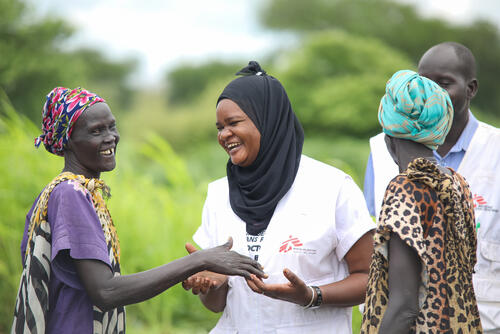
Who we are
We are Médecins Sans Frontières
Awa Abdumadou, MSF nurse activity manager, shares a laugh with a community volunteer during a weekly visit to one of the 17 integrated community case management sites in Abyei. South Sudan, August 2023.
© Isaac Buay/MSF
An international, independent medical humanitarian organisation
Médecins Sans Frontières (MSF) translates to ‘doctors without borders’. We provide medical assistance to people affected by conflict, epidemics, disasters, or exclusion from healthcare. Our teams are made up of tens of thousands of professionals working in health and medical care, logistics, administration, communications, skilled trades – all bound together by our charter and serving people in need. Our actions are guided by medical ethics and the principles of impartiality, independence, and neutrality. We are a non-profit, self-governed, member-based organisation.
MSF was founded in 1971 in Paris by a group of journalists and doctors. Today, we are a worldwide movement of over 69,000 people.
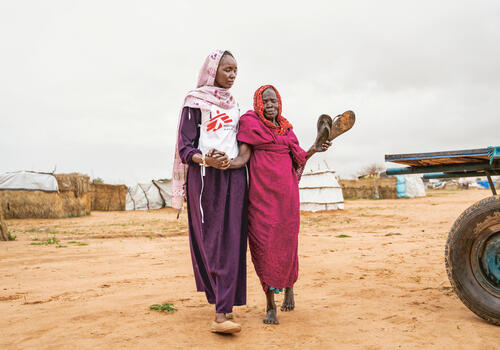
An MSF health promoter accompanies a displaced woman to the MSF clinic in Adré transit camp. Chad, July 2024.
© Ante Bussmann/MSF
The MSF Charter
Médecins Sans Frontières is a private, international association. The association is made up mainly of doctors and health sector workers and is also open to all other professions which might help in achieving its aims.
All of its members agree to honour the following principles:
Médecins Sans Frontières provides assistance to populations in distress, to victims of natural or man-made disasters and to victims of armed conflict. They do so irrespective of race, religion, creed or political convictions.
Médecins Sans Frontières observes neutrality and impartiality in the name of universal medical ethics and the right to humanitarian assistance and claims full and unhindered freedom in the exercise of its functions.
Members undertake to respect their professional code of ethics and maintain complete independence from all political, economic or religious powers.
As volunteers, members understand the risks and dangers of the missions they carry out and make no claim for themselves or their assigns for any form of compensation other than that which the association might be able to afford them.
Complementary to the Charter
Complementary to the Charter, two core documents define our ways of working and guiding principles by exploring the concepts of proximity to patients, quality medical care, and témoignage - or bearing witness.
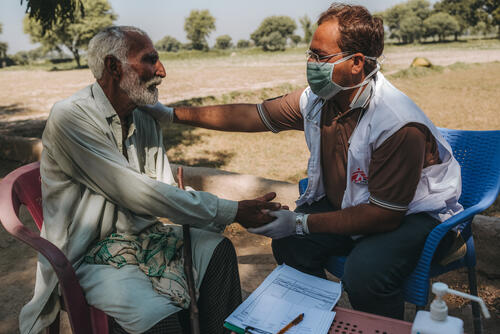
About MSF
Chantilly Principles
msf.org 4 Oct 1995
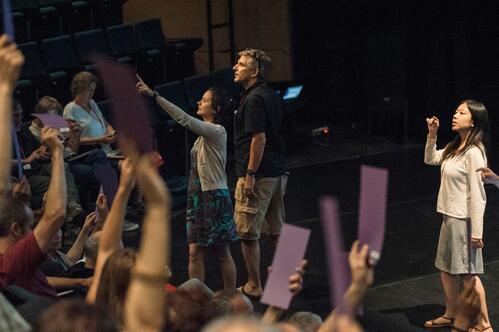
About MSF
La Mancha Agreement
msf.org 25 Jun 2006
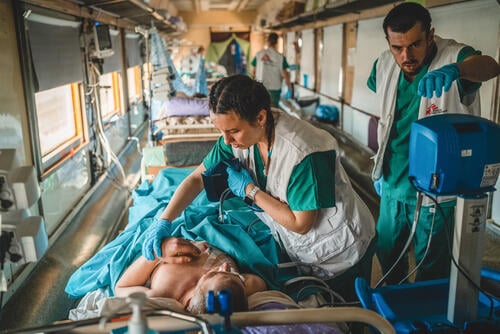
People and patients first
Our actions are guided by medical ethics
MSF’s actions are first and foremost medical. Our guiding aim is to provide the best quality of care possible – wherever we work – and to act always in the best interest of people and patients: to respect their confidentiality, their right to make their own decisions, and above all, to do them no harm. When medical assistance alone is not enough, we may provide shelter, water and sanitation, food, or other services.

We aid people based on need. It doesn’t matter where they are from, what they believe in, or what their political affiliations are. We give priority to those in serious and immediate danger.

Our decision to offer assistance is based on our evaluation of medical needs, independent of political, economic, or religious interests. Our independence is rooted in our funding; 98 per cent comes from private donors giving small amounts. We strive to freely evaluate needs, access communities without restriction, and to directly deliver the aid we provide.

We do not take sides in armed conflicts, nor support the agendas of warring parties. Sometimes we are not present on all sides to a conflict; this may be because access is denied to us, or due to insecurity, or because the main needs of a group of people are already covered.

“We are not sure that words can always save lives, but we know that silence can certainly kill.” In his Nobel Peace Prize acceptance speech, former MSF President Dr James Orbinski outlined our principle of speaking out publicly when we want to bring a ‘forgotten’ crisis into view, or where we see things taking place which harm those that we seek to assist. This may mean criticising governments, corporations or other organisations who are perpetuating abuses or implementing harmful policies.
Read our latest communications

We strive to be as open and transparent as possible when it comes to the work we do and the money we spend. We continually reflect on both our successes and failures to ensure that the efficacy, quality, and efficiency of the care we provide is always improving. We hold ourselves publicly accountable for our work and our shortcomings, and to be clear about the challenges we face.
MSF transparency and accountability

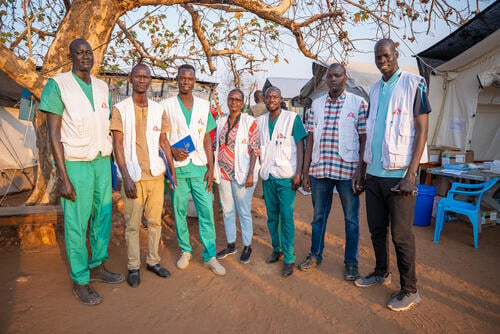
Over 69,000 team members
Our strength lies in our teams, from health staff, to logisticians and administrative staff. In 2023 we employed 55,000 staff locally and thousands more left on field assignments abroad.

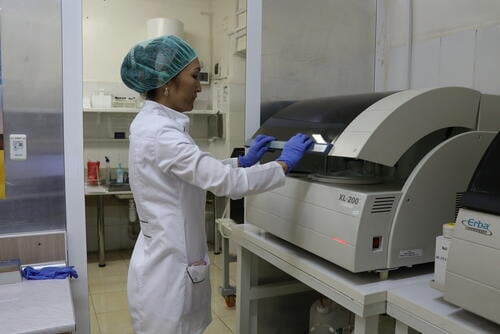
Providing quality care
We don’t believe that resource-limited countries should have sub-standard medical services. We strive to provide high-quality care to patients, and we advocate for affordable, high-quality medicines.

Support from individual donors
We count on the generous support of more than 7.3 million individual donors worldwide. Ninety-eight per cent of our funds comes from private donations, allowing us to act fast to save lives.
With over 69,000 staff members of 169 nationalities working in more than 70 countries around the world, we recognise that diversity, equity, and inclusion are inextricably linked to the success of our medical humanitarian mission. We are making changes across MSF to better reflect this incredible diversity and build one global workforce, by challenging operational structures, creating more opportunities for locally hired staff, re-evaluating compensation and benefits policies, and more.

Sarah Kimat – Nursing Activity Manager, Cholera Treatment Centre (CTC) in Juba’s internally displaced persons (IDP) camp, ex-PoC. The current cholera situation in the ex-PoC 3 is alarming. We are still receiving critical patients on arrival. The situation remains dire despite our best efforts in case management. The living conditions in the camp are extremely poor. There is no access to clean water, and the little water available is sold by trucks at exorbitant prices—SSP 1,000 for just 20 litres. For families who cannot afford basic food or milk, purchasing water is unimaginable.
© Isaac Buay/MSF
Our history
Médecins Sans Frontières (MSF) was founded in December 1971 in France by a group of doctors and journalists in the wake of war and famine in Biafra, Nigeria. Their aim was to establish an independent organisation that focuses on delivering emergency medicine aid quickly, effectively and impartially.
Three hundred volunteers made up the organisation when it was founded: doctors, nurses and other staff, including the 13 founding doctors and journalists.
MSF was created in the belief that all people should have access to healthcare regardless of gender, race, religion, creed or political affiliation, and that people’s medical needs outweigh respect for national boundaries. MSF’s principles of action are described in our charter, which established a framework for our activities.
Founders of MSF
- Dr Jacques Beres
- Philippe Bernier
- Raymond Borel
- Dr Jean Cabrol
- Dr Marcel Delcourt
- Dr Xavier Emmanuelli
- Dr Pascal Greletty-Bosviel
- Gérard Illiouz
- Dr Bernard Kouchner
- Dr Gérard Pigeon
- Vladan Radoman
- Dr Max Recamier
- Dr Jean-Michel Wild
1971
A Charter for the new MSF
MSF is officially created in Paris on 22 December 1971. At the time, 300 volunteers make up the organisation: doctors, nurses and other staff, including the 13 founding doctors and journalists.
1972
MSF’s first operations
MSF staff undertake the first activities in 1972, in Managua, Nicaragua’s capital. It follows an earthquake which destroyed most of the city and killed between 10,000 and 30,000 people.
1974
Hurricane in Honduras
In 1974, MSF sets up activities to help the people of Honduras, after Hurricane Fifi causes major flooding and kills thousands of people.
1975
Turning point
In 1975, MSF establishes our first large-scale medical programme during a refugee crisis, providing medical care for Cambodians seeking sanctuary from Pol Pot’s oppressive rule.
In these activities over the first couple of years, the weaknesses of MSF as a new humanitarian organisation become readily apparent: preparation is lacking, doctors are left unsupported and supply chains are tangled. It marks a turning point, and the movement begins to fracture.
1976
Learning to work in a war context
From 1976 and until 1984, MSF is present in Beirut and other cities in Lebanon to treat war-wounded people, including those with bullet wounds, broken limbs and burns. But materials and tools are insufficient or inadequate for the medical teams; there are no X-rays, no electric instruments, no possibility to conduct extensive medical exams.
Throughout the nine years MSF is in Lebanon, teams learn to provide wartime medicine to thousands of patients. Doctors save lives with very little material, in a context where neighbourhoods are bombarded.
1979
Competing visions lead to split
Throughout the 1970s, and led by Dr Claude Malhuret and Dr Francis Charhon, MSF begins to move beyond sending doctors to crisis zones in favour of creating a more structured organisation. Co-founder Dr Bernard Kouchner doesn’t agree with the evolution, and leaves MSF to start another organisation, Médecins du Monde (Doctors of the World).
1980
A transformation
From this point, the new “realist” leadership of MSF—spearheaded by Claude Malhuret and Rony Brauman—helps transform MSF into the professional organisation it is today.
1980
Cambodia
A first témoignage - or speaking out, bearing witness - on the international scene is organised with the “March for Survival of Cambodia”.
1984
Ethiopia - famine and speaking out
In August, 50 people die each day of hunger in Ethiopia, while thousands wait for food distribution. It takes months for the government to call it a famine. When the government starts to forcibly displace people and divert humanitarian aid, MSF teams know that there is no other possible choice but to speak out. In December 1985, one of the two MSF sections working in the country is expelled, after denouncing conditions in which people are being detained and then moved.
1988
50,000 dead in Armenia
A deadly earthquake in Armenia sparks the first large-scale intervention by the then-six Operational Centres (France, Belgium, Spain, Luxembourg, Holland, and Switzerland).
1991
Civil war in Somalia
More than 300,000 Somalis die in a brutal civil war. In December 1992, the US army lands in Mogadishu to restore order and distribute food aid. The operation is a failure. Faced with the prospect of getting stuck in an endless conflict, the US withdraws and hands over the mission to the UN blue helmets.
MSF condemns the inconsistency of this strategy, as well as the excesses committed by the military. In 1992, MSF alerts the international community to the widespread famine in the country and opens malnutrition treatment programmes.
1991
War in Yugoslavia
War breaks out in the former Yugoslavia in 1991. In December 1995, the signing of the Dayton Peace Accords ends the separatist war and creates the state of Bosnia-Herzegovina. MSF claims that mass distributions of aid are a ‘humanitarian alibi’ of an international community that lacks the will to take political and military measures to end the conflict. Some MSF leaders even call for an armed intervention against the Bosnian-Serb artillery bombing of Sarajevo.
1993
Bosnia
During the Bosnian war, MSF’s medical programmes in the region are extended to the UN’s supposed “protected zones” of Goradze and Srebenica.
In December 1992, MSF publishes a report describing the Bosnian Serb policy of ethnic cleansing. The report denounces the Bosnian Serbs for hindering supplies to Srebrenica and Gorazde, two Muslim besieged enclaves.
1994
“Doctors cannot stop a genocide”
Genocide erupts in Rwanda. MSF teams witness the massacre of patients and staff.
In May, MSF asks the French government to help put a stop to the massacre, before appearing in front of the UN Human Rights Commission, hoping to trigger a reaction from member states, but in vain. Following the massacre of more than 800,000 Tutsis and moderate Hutus, MSF takes an unprecedented decision and requests an international military intervention. “Doctors cannot stop a genocide”, reads the statement from MSF.
1995
Srebrenica massacre
In 1995, MSF raises awareness and denounces the lack of protection of the people in Srebrenica and Gorazde, Bosnia, which had been declared safe zones by the UN and theoretically protected by troops under the UN mandate.
MSF is the only international presence during the fall of Srebrenica, and in August, denounces the massacre of 8,000 civilians at the hands of the Serbian troops.
1995
War in Chechnya
In December 1994, Russian tanks enter the Chechen republic capital, Grozny. A million people are trapped under a barrage of bombs, rockets and machine-gun fire. The city is razed to the ground.
An MSF team provides medical support in highly insecure conditions. Two years later, MSF calls on the international community to get the Russian government to stop the massive violation of human rights in Chechnya and the systematic attacks against civilians.
1998
Famine in Sudan
MSF provides assistance while denouncing the shortcomings of the United Nations aid system, which does not help the most vulnerable but instead benefits the most powerful. MSF’s complaint is primarily aimed at the UN Children’s Fund (UNICEF) and the World Food Programme (WFP).
1998
Famine in North Korea
Having responded to famine in North Korea since 1995, MSF pulls out after three years, unable to ensure that medical aid will reach the most vulnerable. However, teams continue to assist refugees fleeing to China.
1999
Second war in Chechnya
MSF calls for access to Grozny and denounces the massive use of violence against civilians by Russian forces.
1999
Crisis in Kosovo
MSF provides medical care to displaced people in Kosovo and in refugee camps in Albania, Macedonia, and Montenegro, as well as to people in Serbia.
1999
Nobel Peace Prize
In October 1999 MSF is awarded the Nobel Peace Prize. The judges choose MSF “in recognition of the organisation’s pioneering humanitarian work on several continents” and to honour our medical staff.
Using his acceptance speech, Dr James Orbinski, president of the then-MSF International Council, speaks directly to the then-Russian leader Boris Yeltsin and condemns Russian violence against civilians in Chechnya. Justifying this unprecedented move, Dr Orbinski says: “Silence has long been confused with neutrality, and has been presented as a necessary condition for humanitarian action. From its beginning, MSF was created in opposition to this assumption. We are not sure that words can always save lives, but we know that silence can certainly kill.”
1999
MSF establishes medicines campaign
The proceeds from MSF’s Nobel Peace prize are used to set up The Campaign for Access to Essential Medicines (later known as the Access Campaign), which advocates for effective drugs, tests, and vaccines that are available, affordable, and adaptable, primarily for people in low-resource contexts.
Prize money is also used to support pilot projects for the clinical development, production, procurement, and distribution of treatments for neglected diseases, which later becomes DNDi.
2000
The HIV/AIDS pandemic
MSF starts treating our first patients with HIV, with our doctors in Thailand able to treat a small number of people thanks to antiretroviral (ARV) drugs that were smuggled in the suitcases of KLM flight attendants. Later that year, MSF is treating people living with HIV in projects in Thailand and Cameroon. By the end of 2001, we were providing HIV treatment in seven countries.
2002
Famine in Angola
In early 2002, MSF conducts an exploratory mission in Bunjei and finds one in three children suffering from acute malnutrition and more than 1,000 fresh graves at the entrance of the village.
MSF calls for other humanitarian organisations, donors, and the government to help. More than 9,000 severely malnourished children and 20,000 moderately malnourished children are treated. Some 200 international staff and more than 2,200 locally-hired staff take part in the response.
2002
Work in Lampedusa, Italy
MSF teams start working at a refugee reception centre on Lampedusa, an Italian island south of Sicily, providing medical care to people newly arrived at the centre after they crossed the Mediterranean Sea to Europe.
2002
Afghanistan
MSF continues to assist people in Afghanistan following the US-led military action.
2002
Growing resistance to malaria treatment
MSF starts using artemisinin combination therapy, and urges national protocol changes in malaria-endemic countries across Africa.
2003
US invasion of Iraq
After the US invades Iraq, MSF teams remain in Baghdad during the war and challenge the US government on its failure to provide adequate medical care to people.
2003
Creation of DNDi
Three years after MSF started looking at alternative ways to finance research and development for drugs to treat neglected diseases, using money from the Nobel Peace Prize, MSF is joined by five organisations in founding a new initiative to undertake drug development, creating the Drugs for Neglected Diseases initiative (DNDi).
2004
Five MSF colleagues are killed in Afghanistan
In June, five MSF staff are attacked and killed while on the road in Afghanistan. The subsequent lack of response from authorities in the wake of the event illustrates their passivity and lack of commitment to ensuring the security of humanitarian workers. As a result, MSF withdraws completely from the country after working there for 20 years.
2004
Tsunami in Southeast Asia
The first MSF team arrives within 72 hours of the disaster, on 26 December 2004, and MSF carries out activities in Indonesia, Malaysia, India, Myanmar, Sri Lanka, and Thailand.
Faced with a wave of unprecedented solidarity, and after establishing the scope of intervention in the area, MSF asks donors to stop making donations for the crisis, having received more funding than needed for our medical programmes in the region. We also ask donors to ‘derestrict’ donations so they can be used for other emergencies.
2005
Malnutrition revolution in Niger
Drawing on ‘derestricted’ funds that came in following the Southeast Asia tsunami, MSF responds to an overlooked and neglected malnutrition crisis in Niger, treating 63,000 severely malnourished children on an outpatient basis with a new therapeutic ready-to-use-food. It is the first time this treatment protocol is used on such a massive scale. MSF subsequently revises guidelines for treating malnutrition to include this innovative approach.
2006
Sri Lanka returns to war
As tens of thousands of people flee renewed fighting in the north of the country, MSF reopens surgical programmes in north and central Sri Lanka after facing a series of setbacks from the authorities.
Jun 2006
La Mancha
In order to cope with the constant growth of its activities, budgets and sections, MSF devotes an entire year to a series of internal consultations and debates. The result is a series of plans to improve MSF’s decision-making processes and governance structures as a movement and as an association. La Mancha Agreement outlines aspects of our action on which we agree and feel are indispensable.
2007
Pushing to scale up malnutrition treatment
With the proven success of ready-to-use therapeutic food in treating severely and moderately malnourished children, MSF campaigns for others in the field to scale up their programmes and to adopt similar protocols. MSF’s Campaign for Access to Essential Medicines pushes for food aid and nutritional programmes to include ingredients that are appropriate for the most vulnerable children—those between six months and two years of age.
2008
Malnutrition crisis in Ethiopia
After detecting alarming rates of malnutrition in children under five years old, MSF initiates an emergency response in the south of the country. The teams treat over 72,000 children with acute malnutrition and distribute food to another 14,000 who are at risk.
2009
Return to Afghanistan
After leaving Afghanistan in 2004 following the killing of our colleagues, MSF returns to the country and begins supporting hospitals in Kabul and in Lashkargah, the capital of Helmand Province.
2009
A difficult year in Sudan
MSF launches emergency activities in southern Sudan in response to escalating violence and outbreaks, while in Darfur, the government expels two MSF sections, and four staff members are kidnapped. Some projects are closed, but MSF nonetheless provides nearly 129,000 consultations and supports numerous local health centres.
2010
Earthquake and cholera in Haiti
MSF launches the largest emergency intervention in its history to that point, just one day after the Haiti earthquake on 12 January. Hundreds of thousands of people are either wounded or dead, and millions have lost their homes. In October, after cholera hits the country, MSF mobilises hundreds of staff members to respond. We open more than 50 cholera treatment centres across the country, launch widespread public education campaigns, and tend to more than 100,000 patients.
2012
The war in Syria
Since the breakout of 13-year-long civil war in Syria, which started the year before, MSF supports a growing number of medical facilities in some of the areas worst affected by conflict. But the humanitarian situation starts to deteriorate across the region. Millions of Syrians seek refuge, but the aid and medical assistance they receive is not enough. In early 2014, five MSF staff are kidnapped in Syria; later that year, MSF withdraws from territories controlled by the Islamic State group.
2013
Leaving Somalia
On 14 August, MSF closes all of our programmes in Somalia, following several attacks against our team members, including the 2011 kidnapping of two staff who were held for nearly two years. The indifference towards, or even acceptance of, these attacks by different parties we were negotiating safe access with put an end to 22 years of medical care by MSF in the country.
2014
West Africa Ebola epidemic
The largest outbreak of Ebola in history is officially declared on 22 March in Guinea and goes on to affect six countries in West Africa, principally in Guinea, Liberia, and Sierra Leone. It claims the lives of more than 11,300 people, including more than 500 healthcare staff – more than all previous outbreaks combined.
At the peak of the epidemic, MSF employs nearly 4,000 locally-hired staff and over 325 internationally mobile staff to combat Ebola. Our teams admit a total of 10,376 people to Ebola treatment centres, of which 5,226 are confirmed Ebola cases.
The outbreak officially ends in June 2016.
2014
War in Yemen
In the second half of 2014, a multi-sided civil war breaks out in Yemen, with armed men from the Ansar Allah party opposing a Saudi Arabia-led coalition of Islamist groups, jihadist forces and a southern Yemeni independence movement. Already a poor country, the war further devastates Yemen, shattering the already-fragile healthcare system. Ordinary Yemenis struggle to access, and pay for, medical care; a massive cholera outbreak in 2017 further ravages the country, killing thousands of people.
2015
Search and rescue operations in the Central Mediterranean sea
Tens of thousands of migrants and refugees embark on perilous sea journeys through the Central Mediterranean to Europe. In May, MSF and other NGOs start running search and rescue operations in the Central Mediterranean.
2015
Hospitals are #NotATarget
On 3 October, a sustained US airstrike on MSF’s Kunduz trauma care centre in Afghanistan kills 42 people, including 14 MSF staff and destroys the centre. In 2016, some 75 MSF-run and MSF-supported medical facilities are attacked in Syria and Yemen.
On 3 May 2016, Dr Joanne Liu, MSF International President, calls on members of UN Security Council to protect civilians and hospitals in war zones.
2016
MSF stops taking EU and Member States funding
In June, MSF announces that it will no longer take funds from the European Union and its Member States, in opposition to their damaging deterrence policies against refugees and migrants, and the EU’s intensifying attempts to push people and their suffering away from European shores. This decision takes immediate effect and is applied to our projects worldwide.
2017
Euro governments feeding the business of suffering
MSF International President, Dr Joanne Liu, sends an open letter to European government leaders: “The detention of migrants and refugees in Libya is rotten to the core. It must be named for what it is: a thriving enterprise of kidnapping, torture, and extortion. And European governments have chosen to contain people in this situation.”
2017
Return to Somalia
After our withdrawal from Somalia in 2013, following repeated violent attacks against our teams, MSF returns to the country, and opens a malnutrition treatment programme in the Puntland region.
Although security has not improved, our commitment to the people of Somalia, who face extreme suffering, led us to dial up activities again. The scale of our activities remains limited, and our ability to operate depends largely on the acceptance and active support we receive from the authorities and host communities.
2017
The Rohingya refugee crisis
Starting 25 August, nearly 800,000 Rohingya fled to Bangladesh, following targeted violence against them in neighbouring Rakhine state, Myanmar. In December that year, a retrospective mortality survey we undertake of survivors reveals at least 6,700 Rohingya - in the most conservative estimates - were killed by violent means in Myanmar between 25 August and 24 September 2017.
In the refugee camps in Cox’s Bazar, Bangladesh, most people live in dire conditions. In response, MSF expands operations in the area, covering water, sanitation and medical activities for the Rohingya.
2018
Successive Ebola outbreaks in DRC
An outbreak of Ebola in Équateur province, northwestern Democratic Republic of Congo (DRC), in May, is the start of multiple epidemics of the deadly disease in the country, lasting until August 2022.
Responders struggled to contain a long-lasting outbreak starting in August 2018 in North Kivu, South Kivu and Ituri provinces, due to the complexities of working in a conflict zone and the inability to gain the trust of communities. The three biggest outbreaks collectively claim the lives of over 2,300 people.
2018
March of Return in Palestine
Starting in March 2018 and lasting until December 2019, the Israeli army fires on nearly 8,000 Palestinians during weekly protests for the right to access their ancestral lands at the fence that separates the Gaza Strip from Israel. People are left with shattered bones, and the need for specialised treatment of the complex injuries greatly exceeds the capacity of local authorities and MSF. We massively scale up our surgical and rehabilitative activities, but difficulties persist in an area that had - at that point - been blockaded for a decade.
2018
Punished for needing to leave
Governments around the world reinforced their borders and migration policies, increasing a trend to keep migrants and refugees out. Those trying to leave Libya via the Mediterranean Sea were repeatedly intercepted. People on the route through Central America faced unimaginable levels of violence. We scaled up our migration response but not without setbacks; we were forced to end search and rescue operations due to Italy closing its ports, and Nauru expelled our teams trying to provide support to migrants trapped on the tiny South Pacific island.
2019
Large-scale measles outbreaks across Africa
The highest number of people with measles in 25 years was recorded, with multiple countries across the African continent experiencing outbreaks of the highly contagious disease. Thousands of children around the world died. DRC was especially hard-hit, where MSF teams used boats to find villages up and down the rivers to provide vaccines in outbreak vaccination campaigns. MSF teams also responded to outbreaks in Cameroon, Nigeria and Chad, among other countries.
2019
HIV 90-90-90 targets reached in KwaZulu-Natal
A year ahead of the deadline set by UNAIDS, MSF’s HIV project in Eshowe, KwaZulu-Natal province, South Africa, achieves the 90-90-90 targets. The targets aim to have 90 per cent of people knowing their HIV status, 90 per cent of HIV positive people on treatment; and 90 per cent of people on treatment be virally suppressed. The result was achieved with consistent community engagement.
2020
Mothers killed in Dasht-e-Barchi, Afghanistan
On 12 May, a group of armed gunmen stormed our maternity wing of Kabul’s Dasht-e-Barchi hospital, Afghanistan, deliberately targeting women in the throes of giving birth and new mothers. The attackers killed 16 women, 2 boys and an MSF midwife. Due to the insecurity and the inability to guarantee the safety of patients, we make the difficult decision to withdraw, leaving women in the area without comprehensive maternity care.
2020
COVID-19 pandemic
An outbreak of a new coronavirus turns into a worldwide pandemic, lasting over two years, with COVID-19 infecting hundreds of millions of people and claiming nearly 2 million lives in 2020 alone. Amid mounting challenges, MSF teams raced in the early days of the pandemic to ensure access to healthcare is maintained for people, and responded to the new disease – in both the countries we work in and countries we’ve never had to respond in before. The Access Campaign also urges pharmaceutical companies not to profit off the pandemic and ensure fair and equitable vaccine allocation.
2021
Three MSF colleagues killed in Ethiopia
The ongoing conflict in Ethiopia’s northern Tigray region forces people to flee their homes and live in terrible conditions, cut off from food, water and medical assistance. Our teams are not spared from the violence. On 24 June, our colleagues María Hernández Matas, Yohannes Halefom Reda, and Tedros Gebremariam Gebremichael are brutally murdered. The lack of answers on who was responsible for their deaths, and the difficulties to support and supply our teams on the ground, make our activities in Ethiopia hard to uphold.
2021
Disease and displacement in the Sahel
The emergence of armed groups across the Sahel region in 2012 has continued to proliferate in the years since, leading to spiralling levels of violence against communities across Burkina Faso, Mali, Niger, and Nigeria. The violence causes waves of displacement, exposing people to other dangers, such as diseases caused by poor sanitation. Our teams – where they are able to access people – respond to extraordinary high numbers of severely malnourished refugee children in Niger, following thousands of people who fled violence in northwestern Nigeria.
2021
50 years of humanity
22 December 2021 marks 50 years since MSF was founded by the signing of the charter in Paris. Half a century on, we continue to be guided by our core principles of independence and impartiality, and the humanitarian spirit that inspired our founders.
2022
Violence in Haiti
The 2021 assassination of the president and the neighbourhood-by-neighbourhood takeover by armed gangs lead to escalating levels of violence in Port-au-Prince. Some communities become trapped without access to food, water, or medical care. Our teams in Port-au-Prince are often overwhelmed by the numbers of people with violence-related injuries. Intense violence forces our medical activities in different areas in the capital to be suspended several times during the year, and throughout the following years.
2022
Escalation of war in Ukraine
On 24 February, surprise, large-scale attacks by Russian forces across Ukraine escalate the long-simmering conflict in the country’s east into full-scale war. We rapidly increase our response, providing staff and materials, as well as training to Ukrainian surgeons and healthcare workers. We devise new ways of reaching people, including using specially-designed medical trains to transport patients, and running mobile clinics for people sheltering in metro stations. We also assist people who seek refuge in Poland, Moldova, Belarus, and Russia, providing them with medical and mental health care.
2022
The resurgence of cholera
Thirty countries record cases or outbreaks of the highly contagious disease, and we respond in at least 10 of these countries, including Nigeria, Syria, Cameroon, Niger, Lebanon, Democratic Republic of Congo, and Kenya. In Haiti, the vast majority of the over 15,000 cases recorded are treated in our facilities. Our teams also support outbreak vaccination efforts.
2023
Conflict in Sudan
In mid-April, war suddenly breaks out across Sudan between the Sudanese army and paramilitary group the Rapid Support Forces. Teams quickly adapted their activities to respond, but amidst sometimes debilitating constraints. New staff were not able to enter the country, or parts of it, and the warring parties systematically block medical and essential supplies. Meanwhile, people are subjected to extreme violence and atrocious living conditions in displacement camps.
2023
Gaza-Israel war
On 7 October, Hamas, which governed the Gaza Strip in Palestine, attacks Israel, killing 1,200 people and taking more than 250 hostage. In response, Israel pulverises Gaza, relentlessly bombing and attacking civilian infrastructure, including hospitals. Supplies of water, food, electricity, and medicines are cut off in a total blockade. Most healthcare facilities no longer function or are barely able to do so; by the end of 2024, over 45,000 people, including eight MSF staff, have been killed. About 90 per cent of Gazans have been displaced, many several times over.
2023
Success for TB
In the space of 11 months, the results of two MSF clinical trials are published, showing vast improvements in treating drug-resistant tuberculosis. The PRACTECAL and end-TB trials use shorter, more effective oral drug regimens, with cure rates of up to 90 per cent.
Pressure from MSF’s Access Campaign also leads to price reductions on a crucial diagnostic test, and drug corporation Johnson&Johnson to drop secondary patents on key drug bedaquiline, paving the way for generic versions.